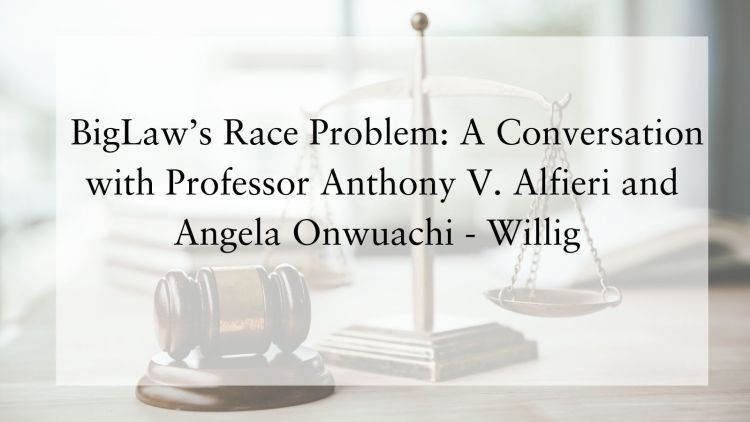BigLaw’s Race Problem: A Conversation with Professor Anthony V. Alfieri

- Date: Monday 24 March 2025, 17:30 – 19:00
- Location: Liberty Building LT (LG.06)
- Cost: Free
Join us for an insightful event with the Legal Professions Research Group, Professor Anthony V. Alfieri (University of Miami) and Angela Onwuachi – Willig (Boston University).
This hybrid event will be followed by a small reception. For any questions, please email g.rogers@leeds.ac.uk.
Abstract
Ever since the 1970s when large law firms began to hire Black lawyers into their associate ranks, large law firms have wrestled with problems in both recruiting and retaining Black associates. Ultimately, BigLaw firms have struggled with the low numbers of Black attorneys who become partners, particularly equity partners, within their organizations. Past scholarship has explored how racial bias and discrimination, both within large law firms and greater society, contributed to such failures in the recruitment, retention, and promotion of Black lawyers in BigLaw firms. More recent scholarship has expanded this exploration advancing a theory about how ‘racial discomfort’, and specifically ‘social alienation’ and ‘stigma anxiety’ related to race, have functioned together to create and maintain racial disparities in attrition and partnership at large law firms. This essay considers the insights of this emerging scholarship against the backdrop of contemporary high-profile employment discrimination litigation embroiling large law firms and narratives about the experiences of Black associates in large law firms across the United States. In so doing, this essay centers on a recent case, Kaloma Cardwell v. Davis Polk & Wardwell LLP, in which the plaintiff, a Black former associate, alleged he had been fired in retaliation for raising concerns about racial discrimination at his law firm. The essay concludes by identifying and assessing innovative firm- and industry-wide policies that can mitigate the impact of racial discomfort on Black associates’ prospects for thriving in and attaining partnership at large law firms.
About the Speakers
Anthony V. Alfieri is a Professor of Law, the Michael Klein Distinguished Scholar Chair, and the founding Director of the Center for Ethics and Public Service and its Black Church Program, Community Equity Lab, and Legal Profession Program at the University of Miami School of Law. He holds a secondary faculty appointment as a Professor of Public Health Sciences at the University of Miami Miller School of Medicine. Professor Alfieri supervises graduate and undergraduate students working on education, research, and policy projects in the fields of civil rights and poverty law, public health, and professional responsibility and the legal profession.
Angela Onwuachi-Willig is Dean and Ryan Roth Gallo Professor of Law at Boston University School of Law. A renowned legal scholar and expert in critical race theory, employment discrimination, and family law, she joined the law school as Dean in August 2018. Before joining the School of Law, Dean Onwuachi-Willig served as Chancellor’s Professor of Law at the University of California, Berkeley School of Law. Previously, she taught at the University of Iowa College of Law, where she was the Charles and Marion Kierscht Professor and at the University of California, Davis, King Hall, where she was Acting (Assistant) Professor of Law. As a classroom teacher at her previous institutions, she taught employment discrimination, evidence, family law, critical race theory, and torts. Dean Onwuachi-Willig is an elected member of the American Academy of Arts and Sciences, American Law Institute, American Bar Foundation, as well as the College of Labor and Employment Lawyers. She is the author of According to Our Hearts: Rhinelander v. Rhinelander and the Law of the Multiracial Family (Yale 2013). Her articles have appeared in leading law journals such as the Yale Law Journal, Virginia Law Review, Northwestern University Law Review, California Law Review, Michigan Law Review, Georgetown Law Journal, Texas Law Review, UCLA Law Review, and Vanderbilt Law Review.

